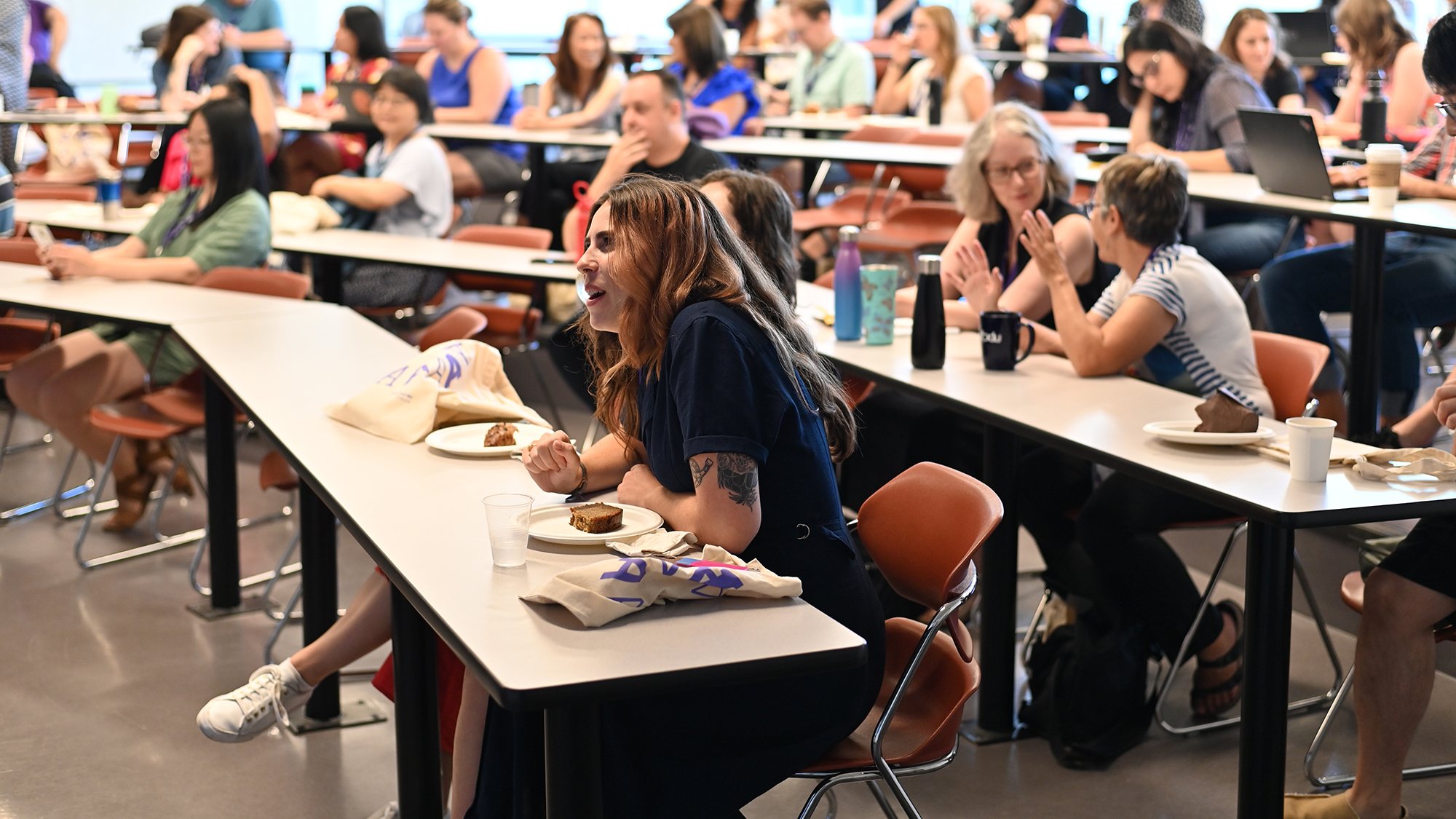

Dr. Patrick Moore, Associate Professor, Department of Anthropology
In Urban Ethnographic Field School, students take part in regular coursework during the mornings (Monday to Thursday), discussing readings and ideas that they are working on, comparing and contrasting experiences of people doing ethnographies all over the world, how they write and what kind of techniques they use, and how they take field notes.
This is also the time that students discuss how to best succeed in their placements and make meaningful contributions to the organizations. The rest of the time, students are working at their placements with various front-line, non-profit organizations working with the community on immigrant services, food and food security, and so on. In this part of their course, students are working on whatever those organizations need them to do, developing the skills that one would use in service-oriented areas.
“In this course, practical learning is about reclaiming that broad set of skills we need as humans to function in our daily life and expanding students' awareness as they deal with diverse people in the real world when placed in organizations that are serving the general public, for instance, people who are food insecure, have mental health issues or have drug dependencies.”
This course allows students to analyze and apply readings to their real-world experiences in different workplace environments and while interacting with community members, eventually allowing them to develop necessary reflective and analytical skills for creating vivid narratives that authentically capture people’s lives in and around an organization.
- Develop students’ abilities to gather information, analyze and reflect on experiences to create unique narratives and tailor their writing to authentically capture a real-world context and its people
- Provide opportunities for students to engage with community members and organizations so that they can add to their experiences of how people live and work
- Provide students with examples of the different styles and operation types that organizations can have in the same environment or locale
- Allow opportunities for students to dedicate themselves to the work prioritized by the organization, and to develop skills enabling them to effectively work with other people
- Provide opportunities for students to apply and develop skills from academic contexts like survey skills, or real-world skills that people need, such as the skills required to put up an irrigation system in an urban farm
- Allow students to conduct ethnographic field work during this six-week course and four assignments to develop their ethnographic writing style, which is more analytical than their usual written assignment expectations, as it forces students to have experiences and think about things quite deeply and reflectively to show through their writing what is going on and capturing what the people are like
Learning Activities
Delivery
Lecture and placement
Method
Students are provided with the following experiences to think about things quite deeply and reflectively, and develop important practical skills to help them be better at whatever job they eventually have:
- Students are prepared to go and work with front line organizations and individuals who use those services.
- Each student conducts a one-hour interview with one representative from the organization that they are placed with, to understand the way the organization works and what it is trying to do.
- Students orient themselves into the organizations they are placed with, studying how the institutions are organized and their priorities, working out their own roles, and how they can contribute while learning about community.
- Students take field notes and complete participant observations during their placements.
- Students frequently converse or conduct interviews with people, reflecting on the many stories and experiences to try to create a vivid narrative about a place or institution.
- Eventually, students create an argument and build a story which is ethnographic and richly descriptive so that readers can learn about these places.
Grading
- Four written assignments (ethnographies): one about the community that they are working in, one about the institution, one about the program, and one that synthesizes everything.
- A final practical display in which students convey the work that an organization is doing. The displays are not academic or PowerPoint presentations, but rather different interactive activities that would highlight what their organization is all about. These displays are shared with community partners during an event at the end of the course.
Why do you incorporate Practical Learning?
I think it is useful for students as it broadens their appreciation for very diverse skills, and helps them realize that those skills, which may not be as highly valued in the academic context, are extremely valuable for them and for communities. The kind of writing that students do, ethnographic writing with vivid descriptions, and thinking about things very carefully and positioning themselves thoughtfully in their work, is a powerful form of thinking and writing. I think the experience of working with community is useful for them, as they see themselves as being able to make substantial contributions to organizations. This work draws on the skills that students have and they make an important contribution through their work. It also provides the community organizations with a positive link with UBC and UBC's resources, like accessing funding through community engagement projects. Our students are not just playing around; they get out there and do stuff, and it is beneficial on both sides, for students and the organizations.
What did students share about their experience with the Practical Learning activities?
I think the amount of work is stressful and demanding with enormous reading and doing half day in class and all the work with the organisations. In spite of so much to be done in a six-week period, students are well prepared, support each other, and write some amazing assignments. The students have a one-page reflection at the end of each ethnography, and they generally are wildly enthusiastic about the whole experience.
They always give us these over-the-top cards at the end of the course. They seem to deeply appreciate having knowledge and experience of different people in a context where it is not fearful for them. There are students, some of our best, who come from other departments that find the overall experience important for them as it is different from a lot of things that they would do in their other courses.
What are some changes or improvements which you wish to include in future?
One of the things that I always worry about, that is always a challenge to deal with, and to which I do not have the total solution is the Downtown Eastside itself. There are dangers associated with that community, and I do not like to expose students to danger. We do minimize danger as much as we can, but there are things that happen there which are not everyday events in most of suburban contexts in Vancouver. I do not exaggerate certain stereotypes, but at the same time, I want to stay realistic and keep students safe. So, I could have students do more of their placements in other areas.
Do you have any suggestions for instructors considering this Practical Learning for their course?
I think one thing that they can do is see who is already doing that kind of work and from talking to other professors get ideas and ways of making it workable. Maybe even have an opportunity to co-teach where they work with somebody who has been doing it for a while and then being experienced that way.
I would just encourage people to do that. It is not the easiest road to academic success, and is time consuming, but I think it is rewarding at the same time. It is extremely valuable for students and for the communities, but you have to have your balance right— what is valued by the academy and disciplines, and still meets student needs.
Practical Learning with Dr. Patrick Moore- Q&A
A previous Final Ethnography Assignment for the course.
Level of Difficulty: High
Delivery: Lecture and placement
Course: ANTH 480 (“Urban Ethnographic Field School”)
Number of Students: 30
Expected Prep Work: High
Time: 6 weeks

